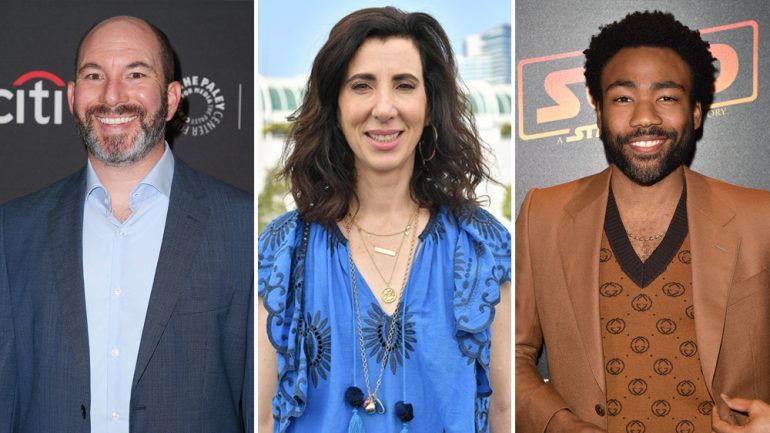How TV Producers Think Outside the Box to Find New, Inclusive Writing Talent
By Whitney Friedlander
LOS ANGELES (Variety.com) – The constant refrain in Hollywood is that we need diversity, particularly when it comes to writers. Unfortunately, this is almost always quickly followed by shrugs of frustration that no one knows where to find unique voices because there are only so many options in the WGA. And therein lies the problem: showrunners, agents and other influential figures often realize that they need to find fresh voices from outside Hollywood, but they aren’t sure where to find them.
Matthew A. Cherry, an executive at Monkeypaw Prods., says his company understands the power that social media can have; that’s actually how founder Jordan Peele discovered him, even though Cherry had no prior experience as an executive. But they also go one step further and offer a portal on their website that allows novice and unsigned talent to submit their writing samples. Applicants must also submit their age, gender and more details so that the staff has a database of ready candidates.
“You never want to have multiple people representing the same perspective if you can help it,” Cherry says. The company tries “to find a couple slots where we could put a new writer into the mix.” Among the shows Monkeypaw has on the air or in development are the TBS comedy “The Last O.G.” and the anthology horror series “Lovecraft Country” for HBO.
Twitter has been successful in expanding the careers of the likes of “The Good Place’s” Megan Amram and “$#*! My Dad Says” creator Justin Halpern or turning such journalists as Ira Madison III and Kara Brown into guild members, but it’s not the only option. UTA TV literary agent Mackenzie Roussos confesses to doing deep dives into her existing clients’ Instagram friend circles and checking out who they’ve reposted or retweeted. She also asks those on her roster, as well as her own assistants and interns, for recommendations.
“The thing I’m always looking for is the most specific voice,” says Roussos, who makes sure to read a prospective client’s past interviews and social media posts to fully understand them before a meeting. She adds that she’s “looking for the person with the most interesting life story or background” that she can help “translate into a point of view” for storytelling.
Andrew Goldberg, the co-creator of Netflix’s animated series “Big Mouth,” knew he needed a large cross-section of comics or marginalized voices for his cult hit. Working the normal route of agents and managers’ submissions as well as his and co-creator Nick Kroll’s connections in the comedy world, the show brought in comedians including Gaby Dunn, who is known for her YouTube videos promoting bisexual and pansexual awareness; UCB improv all-stars such as Emily Altman and Gil Ozeri; and rising comics including Jaboukie Young-White and Jak Knight. All these people, Goldberg says, “are just good comics and performers and people” but who may also be “on the road half the time [so] when they’re in town they come in a couple times a week.”
Goldberg says this exhaustive search process was also necessary for another reason: “Big Mouth” is a show about the horrors and indignities of puberty, so while “racial diversity [and] also gender diversity for our show is important … what we found also is that it’s super important to have age diversity.
“Those of us in our 30s and 40s, we went through puberty before social media and before cell phones and the internet was so pervasive,” he says. “It’s really useful to have people in their 20s in our room who have gone through it in a way that’s more similar to what our characters have gone through.”
It also helps when networks and studios recognize that their diverse shows require diverse voices, even if they’re not the most traditional choices. FX’s “Atlanta” has an all-black writers’ room full of mostly novice writers that include Ibra Ake, the photographer and visual artist associated with creator Donald Glover’s musician alter ego, Childish Gambino. Tanya Saracho told Variety earlier this year that Starz executives just assumed she wanted to create the industry’s first-ever all-Latin writers room for her dramedy “Vida” (they were right).
Reaching out beyond traditional ways is just the start. , the co-creator and showrunner of the CW’s “Crazy Ex-Girlfriend,” says if we truly want to foster diversity we need to look at roles including writers’ PAs and assistants — positions that are major inroads to booking staff gigs or finding representation.
McKenna suggests those in power utilize Skype or FaceTime to interview non-local applicants because “among the types of diversity that we don’t have in the business is we just don’t have enough economic diversity,” she says.
“We need to have a better system for supporting young people when they’re trying to break into the business and one thing that would really help is having these entry-level jobs pay better and that we support people as they try to move to L.A. and New York.”

